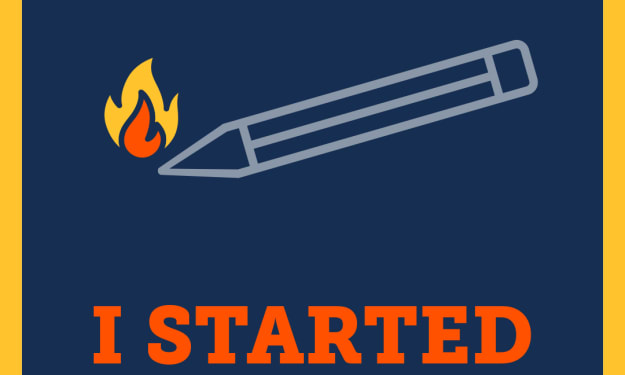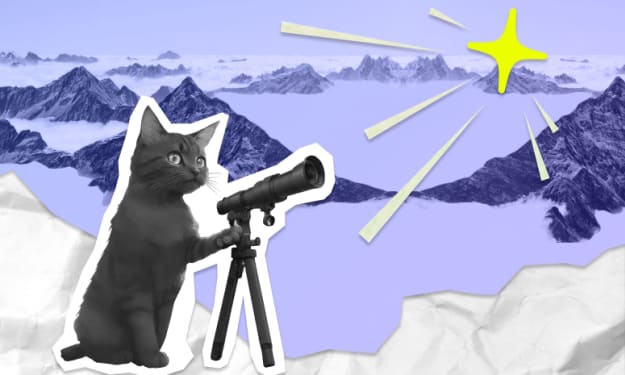So You Want to be a Ghost Writer
Hidden In Plain Sight

I awoke one morning last spring, rolled over, turned on my cell phone, and perused my news feed. I opened a piece on stoic philosophy. A pang of panic shot through me. A bolt of electric pain somewhat akin to jealousy shot through my body. My words stood in bold staring back at my wondering eyes. My hook, for a piece I had just finished and turned in a day or two before, loomed in electronic print as the lead in to a piece in The Daily Stoic. Initially torn between pride and fury, I learned a very important lesson that day.
There is a very negative side to ghostwriting that one doesn't think about while struggling to make money writing. As a new writer, I was struggling to make enough money to pay for groceries.
I spent hours researching topics. When I was lucky, I spent hours researching topics that interested me. When I was unlucky, I spent hours researching topics that bored me to tears. In the earliest days of writing for pay, I made a penny per word regardless of how much time I spent researching, editing, and perfecting. Not only did I get little reimbursement for my time, but I got absolutely no recognition.
What Does It Mean to Pay Your Dues?
As a writer without a journalism degree, I was struggling to get any writing gigs at all. I found my way to sites like Upwork and took writing assignments that paid me less per hour than anything I had ever done before. I paid sites to allow me the opportunity to plug my writing skills to those seeking writers. I paid sites on the back end after I had won a writing gig and completed pieces. I waited for up to two weeks after my assignment was complete for the new owner of my words to approve my pieces. Once the buyer was satisfied with a piece and had paid the site, I waited again. After an average of 21 days I would finally receive payment for my services.
Opportunity Knocks
After about a year of accepting gigs paying a penny to a nickle a word, I was offered the opportunity to be a contracted ghostwriter. Of course, this meant signing a Nondisclosure Agreement. If I wanted this job, I would have to sign a contract indicating that not only would I not use my own words, but I would never tell anyone that the words I had written belonged to me.
I was given to understand that my words could be used both as I presented them and as part of larger works, podcasts, and presentations. Indeed, if I put my name to the contract, I promised to never bat an eye regardless of how much money the new owner of my intellectual property made with my thoughts and words. If I chose to put my name to this contract, I would also be agreeing to allow the buyer to disclose my identity at any time he chose.
Choosing
Plenty of people choose to become ghostwriters. Many people get paid well to help experts edit and shape their stories. Many ghostwriters are eventually known for the works they do.
However, when I learned that not only did I have no right to disclose that these words originated in my mind, but that the new owner of my words could, if and when he chose, disclose that I was the true author of his work, I decided to walk way from this dubious opportunity.
It was hard to decide to say no to a reasonable writing opportunity. I was being offered between six and ten cents a word for my work. I was being told that, if my words please, I would have months of repeat business. I could, perhaps, have reconciled myself to never disclosing my authorship. However, I just couldn't agree to allow someone else to attach his name to mine if it became advantageous for him to do so.
When You Ask Yourself, "Is Ghostwriting Ethical?"
In graduate school, plagiarism was considered a sin tantamount to murder. We were taught in no uncertain terms that one simply did not use another person's words without providing them with credit. However, I wasn't working in academia. I was trying to make a few dollars and build enough of a portfolio to make more than a penny a word. To do that, I basically had to take what I could get. What I could get was a penny a word.
I know that one of the things that kept me from accepting this offer was my belief that one should be true to the author of a thought. I know that one of the things that kept me from accepting this offer was my love for my mind and the words it produces. However, perhaps more than that, the thing that kept me from agreeing to this particular opportunity was the feeling that I was helping someone else to perpetrate a lie.
I was being offered the opportunity to write for a man who considered himself an authority on the psychology of men. I, a woman who had never spent a day as an expert on life as a man, was being asked to write from the persona of an expert on masculinity and to provide this man with the power to decide if and when my connection to this masquerade would be revealed.
I decided that I value myself more than this expert did. I decided not to masquerade as a masculinity expert, for a few dollars. I decided that to sell my integrity and the power to reveal or cloak my identity was unacceptable to me. In decided that the words of William Shakespeare, "To thine own self be true," are words worth listening to.
The Punch Line
Ultimately, I decided that the value of this story, even if I only trotted it out at cocktail parties, was worth more than what I was being offered for the piece I was being asked to write. This offer didn't even come with a guarantee of multiple sales. I was being asked to provide a single written piece, along with a promise of my compliance with this authority's illusion of authority, for the cost of one hundred dollars.
Perhaps the dilemma would have been more problematic if the reward was larger or the lie felt less surreal. As it was, I gave up a little pay day and the opportunity to help an expert proliferate his brand for a little giggle. I gave up the opportunity to provide thoughts and words for someone seeking money and recognition for a story to tell over a glass of wine. I suppose, I really did prove that day that I'm no expert on the masculine psyche.
About the Creator
Nalda Parker
Nalda has led a rich and varied life. She has worked as a college professor, a mental health counselor, a psychosocial rehabilitation therapist, a research assistant, a retail associate, and a starving artist.






Comments
There are no comments for this story
Be the first to respond and start the conversation.